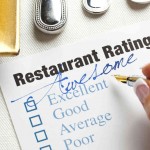 The huge influence of online reviews has led to an inevitable array of attention, both from those trying to work the system and from those trying to understand it better. Last week for instance some research led by Georgia Tech was released highlighting the important role weather plays in the kind of reviews we leave a restaurant. When it’s raining for instance, we’re more likely to leave a bad review.
The huge influence of online reviews has led to an inevitable array of attention, both from those trying to work the system and from those trying to understand it better. Last week for instance some research led by Georgia Tech was released highlighting the important role weather plays in the kind of reviews we leave a restaurant. When it’s raining for instance, we’re more likely to leave a bad review.
A new study published recently by Stanford has turned the tables somewhat, and looks not at what reviews say about the restaurant or hotel, but what they say about us, the reviewer. After trawling through some 900,000 reviews of over 6,500 restaurants via Yelp, the researchers believe they’ve got a pretty good insight into our state of mind when we leave a review.
Dan Jurafsky, a professor of linguistics at Stanford University and one of the coauthors, says, “Our goal was to examine online reviews not for what they tell us about restaurants, but rather for what they tell us about people, about the psychology of the person who wrote the review. We studied the meanings that are hidden in the way people use words and connotations.”
The researchers used a range of linguistic analysis techniques to determine certain characteristics of each review, and the language used. Several fascinating trends began to emerge.
- Positive reviews of expensive restaurants often used sexual metaphors, with more elaborate uses of language deployed, with the clear intention to portray sophistication and education on the part of the reviewer.
- Positive reviews of cheaper restaurants however would typically use metaphors relating to drugs or addiction, with women more likely to use this approach than men, especially when describing foods such as pizza, burgers and sushi. The kind of foods society has taught us are guilty pleasures in other words.
- In contrast, negative reviews would utilise personal trauma as a mechanism to hook the review upon
It was particularly noticeable how visceral many of the reviews were, with a striking resemblance to the kind of tone used when describing a personal tragedy, especially when we suffered from bad customer service.
“Bad reviews,” the paper says, “seem to be caused by bad customer service rather than just bad food or atmosphere. The bottom line is that it’s all about the personal interactions. When people are rude or mean to you, it goes straight to your sense of self.”
The reviews were regarded therefore as part of the coping mechanism used to get over this customer service related trauma.
What was particularly evident however was the way the review reflected upon the reviewer.
“Across multiple variables, online review narratives reveal the reviewers’ concern with face and the presentation of self,” the researchers write.
So what does this mean for the restaurant industry? Well, an obvious place to start is to focus on customer service, given that this is a frequent cause of distress within negative reviews.
Haha, nowt as queer as folk as they say. Fascinating stuff 🙂
http://mashable.com/2014/08/06/hotel-apologizes-b…
A restaurant threatening to charge guests $500 if they post a negative review. You couldn't make it up lol
Incredible. Thanks for sharing that Andrew.